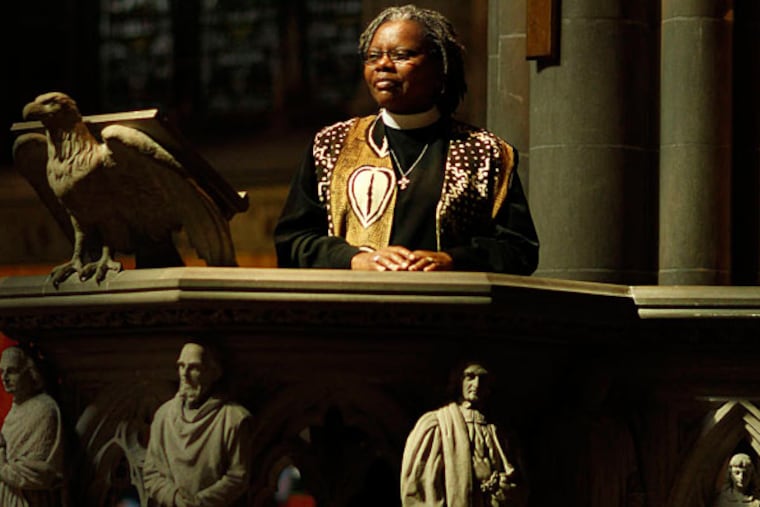Call it North Philly's hub for civil rites
DURING A recent stroll through the vast building and sprawling grounds of North Philadelphia's George W. South Memorial Church of the Advocate, the Rev. Renee McKenzie passed a group of Temple University student volunteers, met a visiting German social worker, greeted a handful of church regulars and stopped to listen to a professional chamber orchestra's rehearsal.

During a recent stroll through the vast building and sprawling grounds of North Philadelphia's George W. South Memorial Church of the Advocate, the Rev. Renee McKenzie passed a group of Temple University student volunteers, met a visiting German social worker, greeted a handful of church regulars and stopped to listen to a professional chamber orchestra's rehearsal.
She hugged a man she had never met who was at the church for a meeting.
"I call the Advocate a gathering place," said McKenzie, who has led the church since 2011. "There's a cross section of folks here."
The North Philly church has long been a pillar of social justice. "When God says to love thy neighbor as thy self, we really struggle to know what that means," McKenzie said.
From 1962 to 1987, when civil-rights lion Rev. Paul Washington led the congregation, the Advocate was a powerful force for equal rights for people of color, women and the gay community. Among other accolades, Washington was known as "the conscience of the city."
Church attendance has fallen since his heyday - McKenzie says about 30 people regularly attend Sunday services - but the mission has not changed.
"Everybody who walks in the door is in some level of crisis," she said. "A lot of people just need a hug. They need to know they've been seen. They need to know they've been valued."
McKenzie is working to rebuild both the congregation and the community around it. She began "by building up what happens Monday through Saturday."
The church added an after-school program that serves dinner four times a week. It started partnerships with nonprofit groups like Mighty Writers, and opened its building to "artist in residence" groups like the Prometheus Chamber Orchestra, which holds open rehearsals and quarterly concerts - and sometimes performs while lunch is served in the church's community feeding program.
The newly established Advocate Center for Culture and Education does outreach to people in the neighborhood.
Now, McKenzie said, her job is to increase the size of the congregation. The church, built in the late 1800s and considered one of the finest examples of French Gothic Revival architecture in the U.S., can easily hold 1,000 people.
Newly trained docents will soon offer tours of the historic sanctuary, and McKenzie holds Sunday services there.
"When you invite people to worship at the Advocate, you're inviting them to worship in this space," she said, gesturing to the spacious sanctuary, its incredible architecture and thought-provoking art. "Any other place would be a poor second."
Where we worship: George W. South Memorial Church of the Advocate is at 1801 W. Diamond St. Enter the massive building at 2121 N. Gratz St.
Sunday services begin at 10 a.m. and last for about 90 minutes, including communion.
McKenzie hopes to increase the number of services in the next year. She suspects one thing that has hindered the congregation's growth is unfamiliarity with what the Episcopal Church stands for. "In the black community, people know Baptist and Methodist, but the Episcopal church has not had a large voice," she said.
What we believe: "Jesus Christ is Lord and savior."
What to expect on a Sunday: "It's a joyful service," McKenzie said. "There are moments of quiet when you can reflect on the mystery of God. I find incredible peace."
While there is music - including an organist, guitarist and pianist - there is no choir. McKenzie hopes to change that, too, in the next year.
A history of social justice: The Rev. Washington had close relationships with the Rev. Dr. Martin Luther King Jr. and civil-rights activist Stokely Carmichael, and the Advocate was a center of activism during the civil-rights movement.
The church hosted the first National Black Power Convention in 1968 and the 1970 Black Panther Conference.
The Advocate also supported equal rights for women. In 1974, the Rev. Washington ordained 11 women in defiance of the Episcopal leadership. (Two years later, the Episcopal Church's general convention said it would allow female priests.)
Good works: The church's community feeding program has operated for more than 35 years. In addition to the children in the dinner program, about 100 people enjoy breakfast or lunch there five times a week.
The murals: In the 1970s, McKenzie said, a church visitor observed, "This is a black church. Why are there no black images?"
That prompted the Rev. Washington to commission 14 murals by artists Walter Edmonds and Richard Watson. Known as the "African Experience Murals," the powerful and in some cases violent images were unveiled in 1976 and attract visitors from far and wide.
Message from the crypts: The church was built as a memorial to George W. South, a wealthy merchant and Philadelphia County treasurer, by his widow and daughter. The largely white congregation changed as the neighborhood around it became more integrated in the 1950s.
South family members are buried in the church, as are many other early church leaders. One of the last things the Rev. Washington did as rector was integrate the crypts by interring a homeless black woman here, McKenzie said.
Big issue we're grappling with right now: "Just meeting people's basic needs" that result from poverty, poor education and other systemic evils, she said.
"People are not recognizing that they are loved by God. They don't see that lived out. They don't see other people loving them in that way."
Biblical words of comfort: "I can do all things through Christ who strengthens me," said McKenzie, the mother of two adult children. "That's what I taught my children: that we have to keep moving forward."